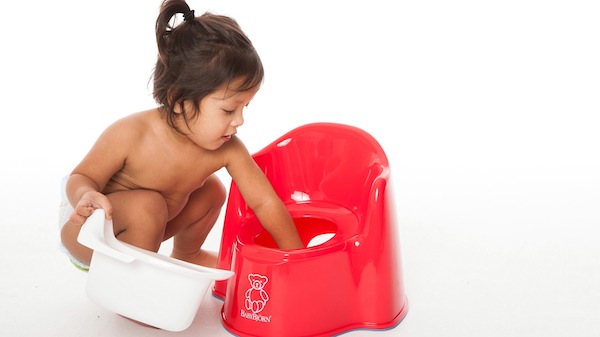
How will our parenting decisions today affect the adults our kids will become tomorrow? Molly Skyar, in open conversation with her mother, Dr. Susan Rutherford, view parenting decisions through a psychologist's perspective.
My Child is trained for peeing but will only poop in the diaper (not on the potty)!
Dr. Susan Rutherford: It’s not unusual at all for children to train for peeing on the potty before they master pooping on the potty. Peeing seems to be easier to control than pooping.
We often hear of early pooping-on-the-potty success as happening accidentally, almost as a byproduct from simply sitting down and peeing. The child may even be surprised: “Oh, what was that?” This is certainly cause for celebration, though it by no means indicates the child is fully potty-trained yet.
MOLLY: This question was submitted from a parent in Baltimore, Maryland. I’m trying to train my little one now (he’s two), and when he has to go poop, he runs and hides in the closet. When I ask if he wants to go on the potty he shakes his head vigorously and says “NO!” Although he pees in the potty all the time, he’s adamant about not sitting on the potty when he has to poop.
DR. RUTHERFORD: I’ve seen that before many times, Molly. That he goes into the closet shows that he knows when he has to go. That’s actually a good sign because it shows he’s aware of what the feeling of needing to empty your bowels means and he will go somewhere to alleviate that sensation.
Here’s the idea about potty-training: In the beginning, infants and babies have no idea when they’re peeing or when they’re pooping. The next stage is that they become aware after they’ve pee’d or after they’ve pooped. The third stage of toileting development comes when a child masters an awareness before the evacuation occurs that allows him to act on the knowledge.
So for your little one, he’s well on his way because he’s aware ahead of time that he’s going to poop and he goes someplace and does it. The trick is to get him on the potty at the point that he almost can’t hold it in and he experiences going on the potty. He’ll see the delight of his mother and father and he’ll want to perform again.
MOLLY: Then just keep trying it that way?
DR. RUTHERFORD: Right. I wouldn’t be at all concerned about a child that only pees in the potty at first.
MOLLY: What if the child is insisting on pooping in the diaper and not in the potty? He will even want to put on a diaper just before he’s going to poop.
DR. RUTHERFORD: Not unusual, either, in the process of things. It’s a process.
It can be helpful if the child has an older sibling or older friend that he can watch use the toilet. Show the young child the older kid’s poop in the toilet and you might find that the concept finally clicks.
In the toddler’s brain, he likely already wants to do everything the older child does. This kind of early peer pressure, or rather, peer example, can be much more helpful than seeing a parent use the toilet.
MOLLY: Is there anything we can do if the child insists on putting on a diaper to poop but is totally potty trained for peeing?
DR. RUTHERFORD: This is a mastery/control issue and this is when it occurs: in the two’s. Potty training is part of the control issue. I would let it go on for a while and realize that it may take a while longer for boys who usually stand up to pee. Encourage him to sit down when he pees.
I would also use pull-ups and an incentive, maybe a sticker chart or other small reward system. Another good resource I’ve found is an e-book by psychologist Dr. Heather Wittenberg called, Let's Get This Potty Started! The BabyShrink's Guide to Potty Training Your Toddler .
MOLLY: What are the possible long-term consequences if the child doesn’t potty train by four?
DR. RUTHERFORD: If by four-years old, the child is still not fully potty trained, consider seeing a pediatrician to be sure there are no medical issues. If there are no medical problems, there may be psychological issues coming into play.
Is this an overt control fight between the child and the parent that gets played out not just in toilet training but in much of every day life? It may also get played out in school and in friendships if the child needs to control the whole scene regardless of other people’s needs.
If the child is unable or unwilling to completely toilet train by age four, it could indicate a more serious problem either emotionally or physically. I would suggest at that point (or even earlier) that the parents seek help from a child therapist and have him checked by his pediatrician. If the issue is chronic constipation, they should look into food sensitivity testing.
Byline:
Molly Skyar and Dr. Rutherford publish ConversationsWithMyMother.com, an online resource for offering practical parenting tips and psychological insight into raising kids. Dr. Rutherford is a Clinical Psychologist in practice for over 30 years. She has degrees from Duke University, New York University, and the University of Denver.
Website: http://ConversationsWithMyMother.com
Facebook: https://www.facebook.com/ConversationsWithMyMother
Twitter: https://twitter.com/MollySkyar
© 2014 Molly Skyar



























